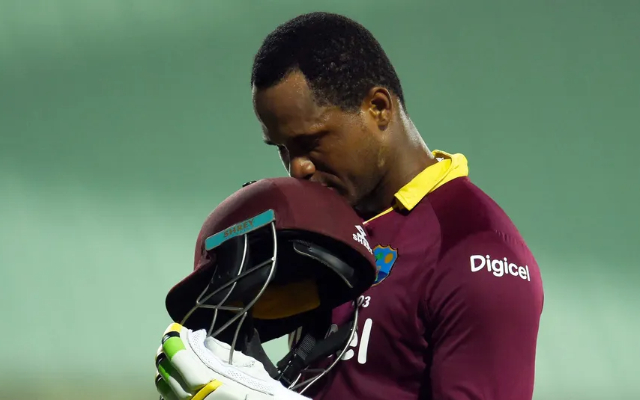
If ever an incident highlighted Marlon Samuels’ approach to cricket and life, it came during Brian Lara’s last game for West Indies – at the Kensington Oval in Bridgetown, Barbados in April 2007. West Indies’s chances of qualifying for the semi-final had long since disappeared, and the fans had flocked to the venue only to say goodbye to Lara, whose individual brilliance had often been the only consolation in a decade of steep decline.
He had already struck three fours, including a trademark flourish square of the wicket off Andrew Flintoff, to race to 18 off 17 balls. Then, with Stuart Broad bowling, Samuels eased one in the direction of Kevin Pietersen at mid-on. Samuels called for the single, and Lara backed up. Then, Samuels decided he couldn’t be bothered. A stranded Lara watched the bails come off for the last time in his career.
Some might have been wracked with guilt at ruining a legend’s farewell in such fashion. If Samuels was, he certainly didn’t show it. He played some gorgeous strokes in a 39-ball 51, including a six and three fours in one over off an increasingly hapless Liam Plunkett. As you watched him, oblivious to the curses of thousands, you wondered just why such talent had never elevated him to Lara-like levels.
On Thursday, the ICC banned Samuels for six years for a breach of its anti-corruption code. The incident dated back to the Abu Dhabi T10 in 2019, where Samuels represented the Karnataka Tuskers without playing a game. After he was charged in September 2021 and found guilty by an independent tribunal in August 2023, the punishment was handed down for bringing himself and the game into disrepute and concealing information from the ICC’s anti-corruption unit.
Unless he had coaching or administrative ambitions, the ban has no real impact on Samuels, except to add another unwelcome asterisk to a stop-start career that already included a two-year ban in 2008 for breaches of the anti-corruption code. He last played for West Indies in 2018 and announced his retirement from the international arena in 2020.
The numbers might suggest a modest talent – Test and ODI averages in the low 30s, and a T20I figure just under 30 – but don’t let those fool you. When Samuels decided to knuckle down and apply that considerable ability, he was a sight for sore eyes. Both West Indies’ triumphs in the World T20 came courtesy his sweet timing – and the man of the match awards in Colombo and Kolkata reflected that.
In Colombo, after West Indies had limped to 32-2 in 10 overs, he took apart a Sri Lankan attack that boasted the near-unplayable skills of Lasith Malinga and Ajantha Mendis. Samuels contributed 78 off 56 balls, easily the standout effort in a low-scoring game. At the Eden Gardens four years later, Carlos Brathwaite grabbed the headlines with his four last-over sixes off Ben Stokes, but it was Samuels that had glued the chase together and made such a finish possible with a dazzling 85 not out (66 balls).
His press conference afterwards, with pads on and shoes on the table, dismayed even those in a chilled-out West Indies dressing room. But that was Samuels, a man who marched very much to the beat of his own drum, who didn’t much care what others thought. If Rhett Butler’s ‘Frankly, my dear, I don’t give a damn’ from Gone with the Wind ever found expression in the cricket arena, it was through Samuels.
In the build-up to Lara’s final World Cup in the Caribbean, West Indies, India and Australia contested a tri-series in Malaysia in 2006. Coming into the tournament, Samuels hadn’t crossed 50 in 14 innings stretching back more than three years. He was a frequent sight in the mall adjoining the team hotel, swanning along in white T-shirt and trousers, adorned with multiple gold chains and sunglasses. In Kuala Lumpur, he made 0 and 5, and was dropped. But there was no change in the swagger. “You’d think he was Viv [Richards] the way he struts around,” said a West Indian commentator who obviously wasn’t a fan. Water off a duck’s back for Samuels, but a reflection of how his largely unfulfilled talent was viewed on the islands.
Instead of this depressing ending, maybe we should recall the beginning. In 2000-2001, he made his Test debut against Steve Waugh’s near-invincible side. It was a dreadful series for the visitors, who were routed 5-0. But Samuels batted with such authority, poise and class for his 60 not out (out of 165) and 46 (from 109) in the Boxing Day Test in Melbourne that Waugh snipped off a part of the red rag he carried around for luck and gave it to him. For a young player, there could have been no greater honour.
Who knows if Samuels still has that rag stashed away somewhere? Maybe if he finds it, it could help him find his way again.




